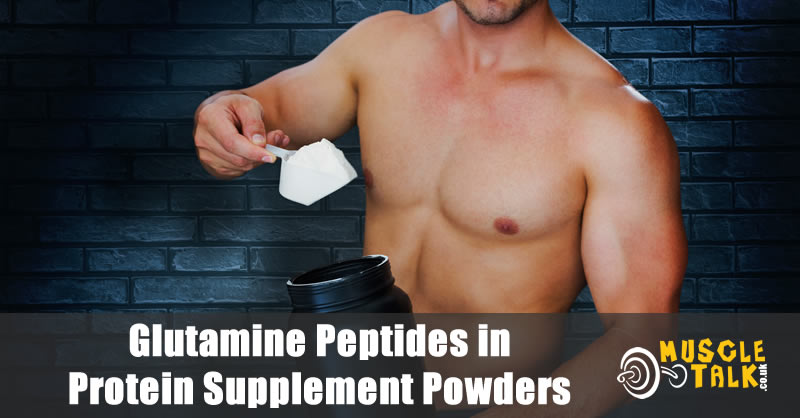The benefits of supplementing with the amino acid L-glutamine are well known and discussed in greater detail in our article about glutamine in bodybuilding. Moreover, glutamine peptides have certain advantages over L-glutamine in that they are absorbed more readily by different mechanisms in the intestines.

Whey protein is naturally high in glutamine and you can read about the benefits of whey protein and the different grades of whey in our article ‘The Complete Guide to Whey Protein Supplements in Health & Fitness‘. However, for the past few years, the price of whey has gradually crept up and up meaning that the most fundamental of our supplements has actually become one of the most expensive of our supplements. This has led to companies trying to find ways to bring down the price of protein so as to make it more affordable for the consumer and to make better profit margins available than the rubbish margins manufacturers, wholesalers and retailers are getting from whey supplement sales.
One thing companies have been doing is formulating and launching more protein blends and then marketing these as their primary protein product. Using a blend of protein sources like soya, wheat, pea, milk as well as whey has been a way of keeping the protein content of the product high – often as much as 80-85% – and manufacturing costs down. There are advantages of using whey protein, but for most of us off-season bodybuilders, recreational gym-goers and sports enthusiasts, a good quality protein blend is perfectly sufficient.
Moreover, companies have also been using other tactics to use cheaper ingredients in order to achieve a higher protein content. These include the inclusion of additional ingredients in a protein powder formula like creatine, taurine and glutamine peptides all of which are relatively cheap. Creatine is formed from three amino acids, so including it in a formula will increase the nitrogen (protein) content. Taurine is an amino acid so adding it to a product increases protein. These are both legitimate ways of increasing the protein as labelled and also have the added bonus to the brand being able to advertise the fact that their product contains these ingredients and the ergogenic benefits associated with them.
As glutamine is popular as a sports supplement and glutamine peptides are relatively cheap, it also makes sense for manufacturers to include glutamine peptides in their blends to bump up the protein content. This practise has received mixed feedback on forums. Some supplement enthusiasts welcome the benefits of a high glutamine content and more reasonable prices, whilst others criticise the practice.
Glutamine peptides are often derived from wheat protein and this has led to concerns that the product would not be suitable for anyone intolerant to gluten, a protein found in wheat, e.g. sufferers of Coeliac disease. This is a sensible and important point and one which I felt needed more in depth research, especially as there have been a few web pages that have been unduly negative about glutamine peptides as an ingredient.
Gluten is the protein in wheat that Coeliacs don’t tolerate. More specifically it’s the gliadin protein fraction of gluten which causes the anti-gliadin antibody to be produced which, in turn, attacks the villi of the small intestine in auto-immune susceptible individuals. Flattened villi, causes the bleeding, discomfort malabsorption, anaemia and other issues symptomatic of Coeliac disease. The other proteins in wheat are of no significance. Glutamine peptides are simply short chain peptides of the amino acid l-glutamine which can be derived from wheat or any other protein. There is no gliadin present so no anti-gliadin antibody will be produced. Also, although Coeliac disease is increasing in prevalence, it’s still not that common, despite the fact that there is a large number of people who self-diagnose as ‘I’m intolerant to gluten’.
There are only two conditions that are medically recognised to be associated with gluten intolerance: Coeliac disease and dermatitis herpetiformis.
To be absolutely certain on this point, I contacted the officially recognised body who advise on Coeliac disease: Coeliac UK. Their answer was:
Food supplements are regulated by the Food Standards Agency so the laws that apply to foods would apply to food supplements. Glutamine is an amino acid that can be derived from wheat but if the final ingredient contains wheat the manufacturer would have to list this on the ingredients. If it just states glutamine then this will be fine for somebody on a gluten-free diet.
If you are concerned about the ingredients and any risk of cross contamination we’d recommend contacting the manufacturer.
If you’d like more information please see our article Coeliac disease and bodybuilding.
The addition of glutamine peptides to protein powders will not add any significant benefit to the formula, but it will help keep the cost of the product down. There are certainly no problems with glutamine peptides being an ingredient. My only issue would be where their inclusion is not included on the label. Supplement labelling dishonesty is, unfortunately, all too prevalent in our industry as discussed in our article ‘Is Your Protein Powder Labelled Correctly?‘.
